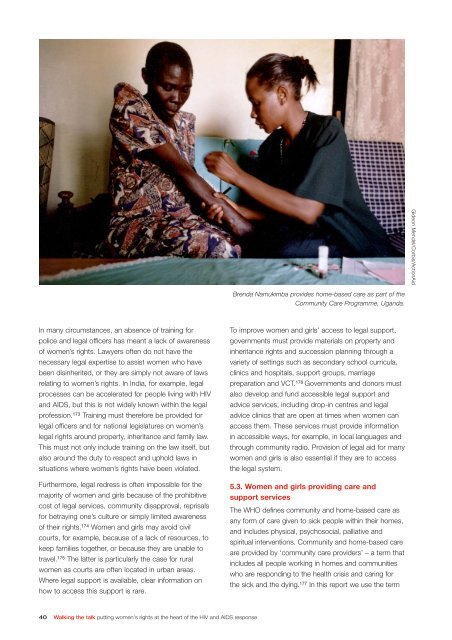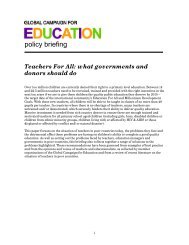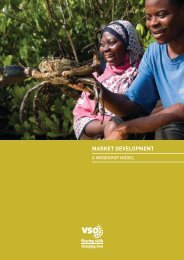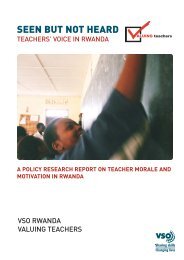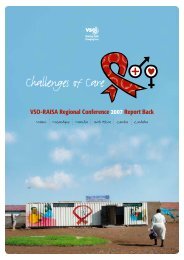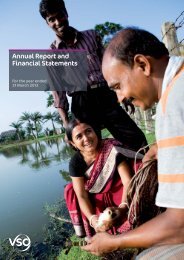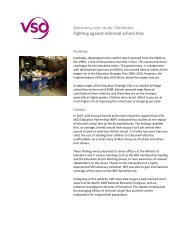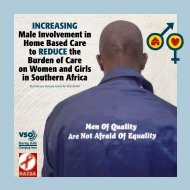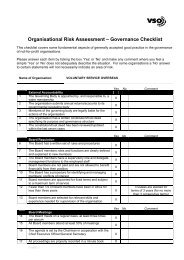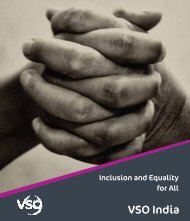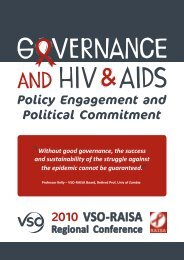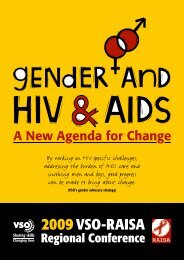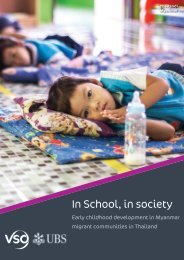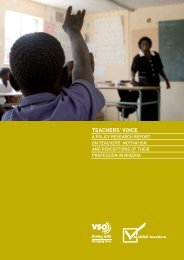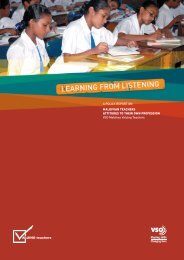Gideon Mendel/Corbis/ActionAidBrenda Namukimba provides home-based care as part of <strong>the</strong>Community Care Programme, Uganda.In many circumstances, an absence of training forpolice and legal officers has meant a lack of awarenessof women’s rights. Lawyers often do not have <strong>the</strong>necessary legal expertise to assist women who havebeen disinherited, or <strong>the</strong>y are simply not aware of lawsrelating to women’s rights. In India, for example, legalprocesses can be accelerated for people living with HIVand AIDS, but this is not widely known within <strong>the</strong> legalprofession. 173 Training must <strong>the</strong>refore be provided forlegal officers and for national legislatures on women’slegal rights around property, inheritance and family law.This must not only include training on <strong>the</strong> law itself, butalso around <strong>the</strong> duty to respect and uphold laws insituations where women’s rights have been violated.Fur<strong>the</strong>rmore, legal redress is often impossible for <strong>the</strong>majority of women and girls because of <strong>the</strong> prohibitivecost of legal services, community disapproval, reprisalsfor betraying one’s culture or simply limited awarenessof <strong>the</strong>ir rights. 174 Women and girls may avoid civilcourts, for example, because of a lack of resources, tokeep families toge<strong>the</strong>r, or because <strong>the</strong>y are unable totravel. 175 The latter is particularly <strong>the</strong> case for ruralwomen as courts are often located in urban areas.Where legal support is available, clear information onhow to access this support is rare.To improve women and girls’ access to legal support,governments must provide materials on property andinheritance rights and succession planning through avariety of settings such as secondary school curricula,clinics and hospitals, support groups, marriagepreparation and VCT. 176 Governments and donors mustalso develop and fund accessible legal support andadvice services, including drop-in centres and legaladvice clinics that are open at times when women canaccess <strong>the</strong>m. These services must provide informationin accessible ways, for example, in local languages andthrough community radio. Provision of legal aid for manywomen and girls is also essential if <strong>the</strong>y are to access<strong>the</strong> legal system.5.3. Women and girls providing care andsupport servicesThe WHO defines community and home-based care asany form of care given to sick people within <strong>the</strong>ir homes,and includes physical, psychosocial, palliative andspiritual interventions. Community and home-based careare provided by ‘community care providers’ – a term thatincludes all people working in homes and communitieswho are responding to <strong>the</strong> health crisis and caring for<strong>the</strong> sick and <strong>the</strong> dying. 177 In this report we use <strong>the</strong> term40 <strong>Walking</strong> <strong>the</strong> talk putting women's rights at <strong>the</strong> heart of <strong>the</strong> HIV and AIDS response
‘care provider’, ra<strong>the</strong>r than <strong>the</strong> often-used ‘care giver’,because <strong>the</strong> latter implies that <strong>the</strong> care is ‘given’ freely,almost as a gift, and <strong>the</strong>refore is assumed not to needrecompense. Part of this assumption is due toworldwide gender stereotypes that expect women andgirls to take responsibility for domestic and care work,and to do so for free. In South Africa, for example, oneevaluation of home-based care found that 91% ofcommunity care providers were women. 178To ease <strong>the</strong> burden on failing health systems (seeChapter 2), community care providers in many countrieshave taken on responsibilities for primary healthcare.Health services that are not considered a priority,especially those services governments think can beprovided by <strong>the</strong> community, are ei<strong>the</strong>r under-funded orignored altoge<strong>the</strong>r. Care and support services for HIVand AIDS fall into this category. In sub-Saharan Africa,for example, hospital-based care is almost nonexistent179 and very little provision is made for homebasedcare services. A 2003 UNAIDS study showedthat, globally across 88 low and middle incomecountries, only 14% of people living with HIV and AIDSwho required home-based care had access to <strong>the</strong>seservices. 180 Given <strong>the</strong> spread and growing impact of HIVand AIDS in Africa, for example, <strong>the</strong> resulting burden oncommunities is reaching a critical point. This is starting tobe replicated across <strong>the</strong> developing world. In Thailand,for example, “two thirds of all adults with AIDS-relatedillnesses are nursed at home by parents”. 181Women and girls as primary (informal)care providersCommunity care providers can be split into two broadgroups: primary (or informal) care providers andsecondary (or formal) care providers. Primary careproviders are family members or close friends whoprovide care and support in <strong>the</strong> home, in what is oftentermed <strong>the</strong> ‘informal’ sector. These responsibilities fallalmost exclusively on women, and increasingly olderwomen and girls, who have little or no support andreceive no recognition for <strong>the</strong>ir work. Older women, forexample, are increasingly looking after <strong>the</strong>ir dying adultchildren and taking on parental responsibilities for <strong>the</strong>irgrandchildren and o<strong>the</strong>r orphans. In sub-SaharanAfrica, up to two-thirds of people living with HIV andAIDS are cared for by people in <strong>the</strong>ir 60s and 70s. Upto 60% of orphaned children live in grandparen<strong>the</strong>adedhouseholds. 182The impact on girls is also particularly severe. 183 Theyare often expected to care for <strong>the</strong>ir siblings and dyingparents, and take on caring and domestic duties whenparents are sick. These duties are particularly harsh fora child, but are made even worse by <strong>the</strong> psychologicaltrauma of losing one or both parents. Thisunsustainable care burden on women and girls isexacerbated when women, who are already providingcare in <strong>the</strong>ir family or community, fall sick with an AIDSrelatedillness. They <strong>the</strong>n turn to ano<strong>the</strong>r female relativeor to a secondary care provider, increasing <strong>the</strong> burdenfur<strong>the</strong>r on care providers.Secondary (formal) care providersSecondary care providers are visiting nurses, healthworkers or community care providers from NGOS orcommunity groups using staff for care delivery. They arebased in <strong>the</strong> ‘formal’ sector and provide a range ofservices for people living with HIV and AIDS (see Box 6).Unsurprisingly, <strong>the</strong> strong gender demarcation of careprovision means that most secondary care providers arewomen. Some are also living with HIV and AIDS, andhave been involved with providing care in <strong>the</strong>ir broadercommunity since <strong>the</strong> beginning of <strong>the</strong> pandemic. As ahome-based care coordinator from Mozambique states:“I came from a state of being critically ill to beingwell as you can see today. It was this thatmotivated me to do this kind of work and helpmy neighbour. There are a lot of people who arein <strong>the</strong> state I was in <strong>the</strong>n.” 184Currently most care and support services are beset by alack of coordination, unsustainable numbers of patientsand unreliable funding from external donors, all of whichhave a negative impact on <strong>the</strong> lives of female careproviders. For example, although an increasing numberof secondary care providers work for home-based careprojects established by networks of people living withHIV and AIDS, NGOs and community-organised groups,many secondary care providers work individually in <strong>the</strong>ircommunities. Fur<strong>the</strong>rmore, many of <strong>the</strong>se networks arenot linked to or supported by state health systems, andhave to work independently.Civil society and NGOs must create and/or streng<strong>the</strong>nlocal, national and regional community and home-basedcare alliances to allow care providers to shareknowledge, skills and resources. Recent examples ofthis are grassroots peer networks such as <strong>the</strong> Home-Based Care Alliances launched in Kenya in 2006 andUganda in 2007, which provide national platforms forpolicy lobbying and coordinated livelihoods work. 185However, <strong>the</strong> sustainable long-term solution to this mustbe greater investment in government care and supportservices as well as greater levels of support for – andco-ordination with – NGOs or community-based careorganisations. National state-led coordination and<strong>Walking</strong> <strong>the</strong> talk putting women's rights at <strong>the</strong> heart of <strong>the</strong> HIV and AIDS response 41


